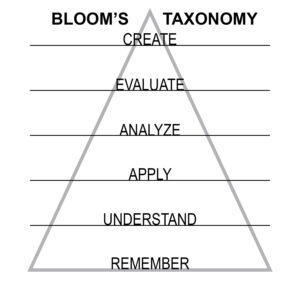 April 17, 2024–Did you know they changed Bloom’s Taxonomy?
April 17, 2024–Did you know they changed Bloom’s Taxonomy?
Anyone who studied education in the past 50 years is intimately familiar with Bloom’s Taxonomy. K-12 teacher education students had this pyramid drilled into them.
To summarize a college semester into one paragraph, Bloom’s Taxonomy proposes six levels of how kids learn. The basic level is acquiring knowledge by memorizing facts, then moving up to comprehending those facts, using them, combining them in new ways, and peaking with being able to evaluate them. Specifically: Knowledge, Comprehension, Application, Analysis, Synthesis, Evaluation.
It was portrayed as a pyramid, like the one of USDA recommended food groups. And like that other pyramid, I never understood the nuances.
But education professors loved using models, to make simple concepts seem more profound. I remember seeing one that looked like a loaf of bread with each slice representing something. I never remembered what it was modeling, only that it made me hungry for a sandwich.
Well, lo, I see the model-makers changed the model in the 1990s in two ways:
1) Changing the nouns into verbs, so Analysis became Analyzing, and
2) Reversing the top two tiers: “Synthesizing” became “Creating” and moved to the top, nudging “Evaluating” down a level. The theory was that in order to Create, one had to already have Evaluated the information.
Yay.
To me, “creating” is what we all should be teaching, learning, and building sandwiches with.
Reader Rolf Smith, Jr. sent me an intriguing article laying out the 10 signs you’re genuinely intelligent, according to psychologist Lachlan Brown. They are:
- You’re constantly curious
- You adapt easily
- You enjoy your own company
- You have a good sense of humor
- You’re open-minded
- You’re a good listener
- You have empathy
- You’re not afraid to say “I don’t know”
- You value quality over quantity
- You appreciate complexity
What strikes me about this list is how it perfectly aligns with traits for creativity.
As an aside, let me say I find it impossible to debate or compare intelligence. The science of quantifying intelligence is controversial, especially when used inappropriately to sort people into groups for purposes of grouping in schooling.
Even as a teacher, I never fixated on determining where an individual falls on the intelligence scale. It is meaningless data to me. I am more interested in creativity and the ability to solve problems, and the energy and willingness to try. Those traits not only are better indicators of later success in life, but they also determine where one ranks on the scale of “suitable dinner companions.”
Here’s my stand: Education, and the world in general, spends too much time on the lower-level skill of teaching facts. They are easiest to master. But memorizing facts is boring, and I would add in this age of the internet, online search, and now Artificial Intelligence, totally unnecessary. Why waste my brain storing information that is accessible with a touch?
The real skill is “Understanding” those facts, “Applying” them to new situations, and arranging them into new constructs that did not exist before. In other words, just like the government’s blighted food pyramid, Bloom’s Taxonomy should be stood on its head. Don’t stop teaching facts, but only use them as a springboard to Creating.
“Creating” is the mission; “Remembering” is the tool.
A perfect example of this approach is the highly successful yet still under-recognized SystemsGo rocketry program, which is gearing up to launch 150 rockets at four launch sites, including Stonewall on May 2-4. In the fall, high school students are told that by the end of the school year, they will design and build a launch vehicle that will heft a one-pound payload one mile high. That’s it. That’s the lesson plan. Everything that follows flows from that. And not only will you do it, but it will be livestreamed around the world so everyone can see how you did it.
You can’t get more creative than that. That’s what all teaching models should look like.
XXX
For information on the rocket launches, visit www.systemsgo.org